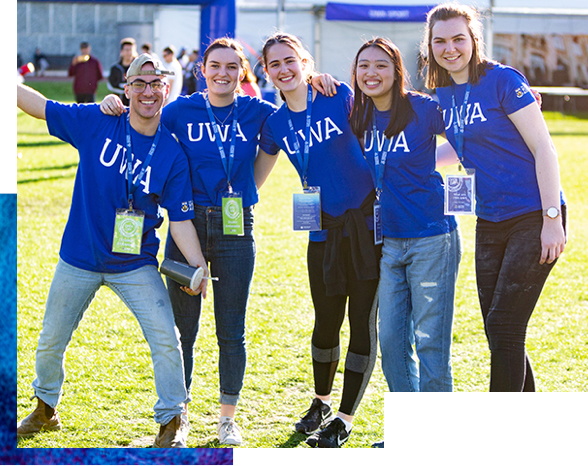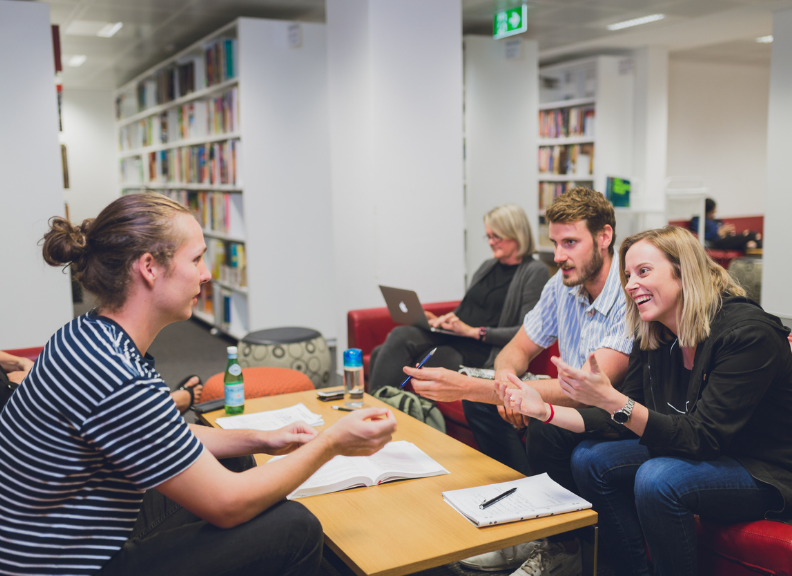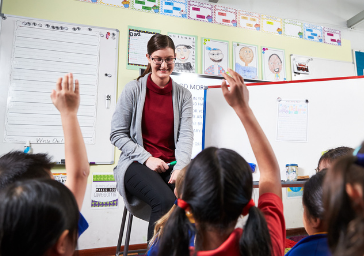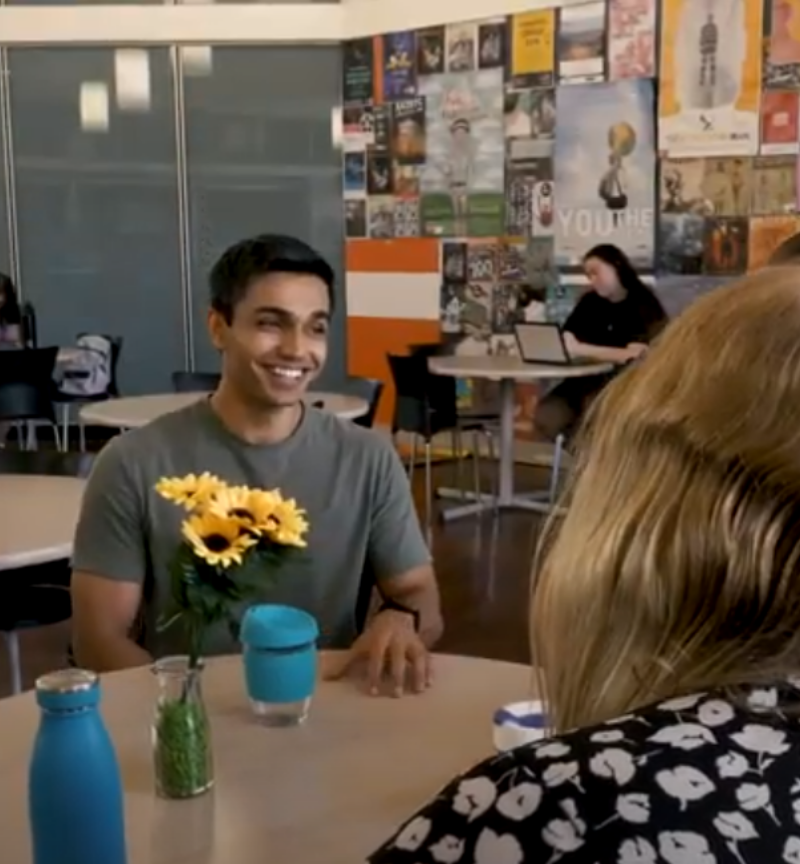Undergraduate + Postgraduate
Bachelor of Science and Master of Teaching (Secondary)
Contact us
Address
Student Central
The University of Western Australia (M355), 35 Stirling Highway, Perth, Western Australia 6009
Telephone
131 UWA (131 892)
International
(+61 8) 6488 1000
Hours
Frequently asked questions
Events you may be interested in
Show more eventsCareers and further study
This course opens up a world of future study pathways and career opportunities.
Career opportunities
You'll be in high demand
A nationwide shortage of qualified STEM teachers within WA and across Australia means you’ll be highly sought after.
Doctor of Education
Fees and scholarships
Domestic Student Fees
For Commonwealth-supported places, student contribution amounts are charged by unit, based on area of study. For a fee estimate, go to the Fee Calculator and select “I want to price my units”. Fees are subject to annual indexation. Refer to the Handbook to identify the units required. More information on how fees are calculated.
Scholarships
Scholarships are available to students from a diverse range of backgrounds, including academic achievement, financial need, educational disadvantage, leadership and community service, artistic or sporting achievements, and being from a rural or remote area.
Cost of living
International Student Fees
Onshore international students are charged an annual course fee, charged per credit point at a rate dependent on the course in which the student is enrolled. Annual course fees are calculated based on an annual study load. Check the handbook to confirm the annual study load for your course.
Find out more about international student tuition fees and visit the fee calculator for the relevant course fees.
Fees are subject to annual indexation.
Scholarships
Scholarships are available to students from a diverse range of backgrounds, including academic achievement, financial need, educational disadvantage, leadership and community service, artistic or sporting achievements, and being from a rural or remote area.
Cost of living
Admission requirements
The University of Western Australia welcomes applications from international and domestic school-leavers. If you’re interested in studying this major, find out the admission details below.
School leaver admission requirements
This course has the following prerequisites:
- 84 ATAR (2024 intake)
- 84 ATAR (2025 intake)
- Satisfactory personal statement
- Final scaled mark of 50 in Mathematics Applications ATAR
Note: Depending on your chosen major/s, there may be additional prerequisite subjects.
Students without a final scaled mark of 50 in Mathematics Applications ATAR should consider applying for the Assured Pathway to Teaching; alternatively, students can contact our Graduate School of Education for advice.
To transfer into this course, a minimum WAM of 65 is required.
Minimum entry requirements
- 12.5
- 10
- 3.1
- 81.8
- 284
- 335
- 15.5
- 316
- 69
- 1210
- 63
- 84
Online personal statement
As part of applying for entry to this course, you are required to submit an online personal statement demonstrating you have the necessary personal characteristics to become a successful educator.
We encourage you to familiarise yourself with the Inherent Requirement Domains for an Initial Teacher Education Professional Practice PDF before submitting your personal statement.
Admission requirements
English competency
English is the language of instruction and assessment at UWA and you will need to meet the English language requirements of the University to be eligible for a place.
This course has higher ELC requirements. Applicants presenting with the IELTS Academic require an overall score of at least 7.5, a minimum 7.0 in the reading and writing bands, and a minimum score of 8.0 in the listening and speaking bands. For more information visit ELC requirements.
How to apply

Ready for the next step?
Find out how to apply through our simple online application process.
We'll guide you through our entry requirements, admission pathways available to you and application deadlines for your chosen course.
We can’t wait for you to join us!
Course details
Seek a career that combines your love of science with making a difference to the future of young people and become a secondary school STEM teacher in just four years. This combined undergraduate and postgraduate degree, the only one of its kind in WA, provides you with in-depth knowledge of the theory and practical skills required for secondary school teaching in STEM subjects.
About the course
Your subject area expertise, coupled with a teaching qualification, will see you thrive in the global knowledge society.
A nationwide shortage of qualified STEM teachers within WA and across Australia also means you’ll be highly sought after.
Quick details
- Available
- Perth (Crawley campus)
- Part-time
- Full-time
- On-campus
- Semester 1
- Undergraduate + Postgraduate
- CM023
- 107430M
Why study this course?
- UWA is the only university to offer this course in WA and is a world-leading science university.
- Gain a competitive edge in your career and enjoy strong employment opportunities with two qualifications in just 4 years.
- You'll qualify to teach two STEM subjects during a national shortage of STEM teachers.
- We're ranked #1 in WA for Education (QS 2024) and in the top 10 in Australia for Teaching (Times Higher Education World University Rankings by Subject 2024)
- 85.6% of UWA teaching graduates are employed full time four months after completing their course (Good Universities Guide 2024).
- We've got 100+ years' experience in teaching educators.
Course structure
In your first three years, you will complete the Bachelor of Science, in addition to four units of postgraduate study. In your final year, you'll complete the remaining units in the Master of Teaching (Secondary).
For more information on the course structure, see our handbook here.
You'll learn to
- apply skills, understanding and professional competencies to practise as an inspiring, flexible and ethical educator who supports all students to reach their full potential
- build and sustain relationships with students and educational stakeholders
- meet the challenges of dynamic educational contexts
- engage in classroom research to continuously improve your educational impact
You may also be interested in
Courses to help you change the world for the better
 Instilling future generations with a love of learning and a desire to seek wisdom could be the greatest way of all to make a difference.
Instilling future generations with a love of learning and a desire to seek wisdom could be the greatest way of all to make a difference.
Get to know our teaching grads: Indianna Brewer-Williams

Indianna Brewer-Williams describes how she combined her passion for sport with science and now shares this with the next generation of global leaders as a secondary school teacher.
Classroom practice
Commonwealth Teaching Scholarships
If you're planning to study teaching, whether you're a school leaver or career changer the Commonwealth Teaching Scholarship provided by the Department of Education is available to eligible new full-time students.
Not only does the scholarship help with study costs but it also provides opportunities to teach in government schools or government-run early learning settings once you graduate.
For information on eligibility and how to apply visit education.gov.au
Teacher demand on the rise
Demand for teachers is strong and trending upwards, particularly for teachers in mathematics, physics and chemistry, who are already in short supply in some areas.
A national school survey from the Australian Education Union highlighted this shortage of maths and science teachers around the country, with more than half of responding principals saying maths and science classes are taught by teachers without a specialisation in those subjects.
7 reasons to study teaching at UWA
 Hear from some of our students and recent graduates about their favourite parts of doing a teaching degree at UWA.
Hear from some of our students and recent graduates about their favourite parts of doing a teaching degree at UWA.
Words of wisdom from teaching graduates
 We asked UWA Master of Teaching graduates what advice they'd give others interested in a career in teaching.
We asked UWA Master of Teaching graduates what advice they'd give others interested in a career in teaching.
Karlie Payne
 Karlie Payne completed a Bachelor of Science and Master of Teaching (Secondary) before landing a job at Perth College in science and sport.
Karlie Payne completed a Bachelor of Science and Master of Teaching (Secondary) before landing a job at Perth College in science and sport.
Q: What has your career looked like since UWA?
A: I have been fortunate to be the Teacher in Charge of Rowing at Perth College, as well as teach PDHPE (personal development, health and physical education) from Kindergarten to Year 10 at Perth College for six years, as well as Sparc, a new innovative subject at Perth College.
Q: Were you always planning to be a STEM high school teacher?
A: I initially intended to pursue psychology; however, I became heavily involved in the UWA Boat Club, co-ordinating rowing programs and developing the Shenton College Rowing Program. By engaging in these opportunities, I realised my passions laid in engaging students to pursue an active lifestyle and using rowing as a tool for this opened up opportunities to connect with schools and education.
Q: What do you love about working in STEM teaching?
A: Working with a range of students to pursue what they love and find new ways to help them explore their creative and curious side!
Q: Who is best suited to a career in STEM teaching?
A: There is a significant push right now to grow innovation, agile thinking and curiosity, so I'd recommend it to people who are willing to stay open to opportunities and encourage investigations and student-centred learning.
Professional accreditation
Unique course in Western Australia
Charlie Greif

Charlie Greif completed a Bachelor of Science and Master of Teaching (Secondary) before landing a job at Como Secondary College.
Q: Did you always plan to be a STEM high school teacher?
A: No! I started my undergrad in neuroscience and genetics, originally planning to get into research. However, towards the end of my degree I realised it wasn’t for me. While at uni, I was a swimming teacher, nanny and volunteer with Uni Camp For Kids and this definitely pointed me in the direction of teaching.
Q: What were your favourite aspects of the Master of Teaching (Secondary)?
A: The course itself taught me a great deal; however, it was on prac that I felt I really learned how to teach. I loved heading up to Karratha for my final prac; it was an incredible experience.
Q: What has your career looked like since UWA?
A: I began full-time work last Semester 2 as a science teacher but also the ATAR psychology teacher at Como. I collaborate with other teachers on lower school assessments, and review, redesign and rewrite resources and assessments for my Year 11 and 12 ATAR students.
Q:What do you love about working in STEM teaching?
A: I adore working with students from every background – their unique views and opinions always spice up every classroom discussion. STEM keeps work exciting with so many different topics and experiments available at your fingertips; seeing the look of awe on students' faces will never get old.
Q: What type of people are best suited to STEM teaching?
A: In order to be a teacher, you must love working with and helping people. A STEM teacher is a person who loves working with kids, helping others and constantly problem solving, who so happens to also have a passion for STEM.
Get classroom-ready with a UWA Education degree
 Read about all the industry connections and hands-on opportunities within UWA teaching courses that will set you up for success.
Read about all the industry connections and hands-on opportunities within UWA teaching courses that will set you up for success.
How a Combined Bachelor's and Master's degree can save you time and money
 Hear how a Combined Bachelor's and Master's degree, including the Bachelor of Science + Master of Teaching (Secondary), can get you into work sooner with two qualifications in just 4 years.
Hear how a Combined Bachelor's and Master's degree, including the Bachelor of Science + Master of Teaching (Secondary), can get you into work sooner with two qualifications in just 4 years.


